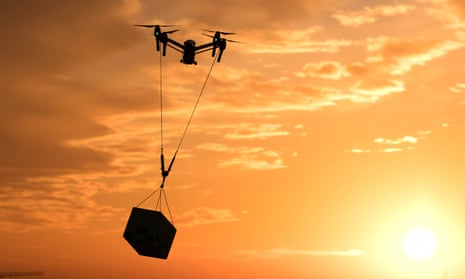Apple, Intel, Microsoft and Uber will soon start flying drones for a range of tasks including food and package delivery, digital mapping and conducting surveillance as part of 10 pilot programmes approved Wednesday by the US government.
The drone-testing projects have been given waivers for regulations that currently ban their use in the US and will be used to help the Federal Aviation Authority draw up suitable laws to govern the use of the unmanned aerial vehicles (UAV) for myriad tasks.
“The enthusiastic response to our request for applications demonstrated the many innovative technological and operational solutions already on the horizon,” said US transportation secretary Elaine Chao.
Apple will be using drones to capture images of North Carolina with the state’s Department of Transportation. Uber is working on air-taxi technology and will deliver food by drone in San Diego, California, because “we need flying burgers” said the company’s chief executive Dara Khosrowshahi.
Others including startup Flirtey, which successfully made the first drone delivery in the US in 2015 test, will be using UAVs to deliver medical supplies to heart attack victims in Nevada , track mosquitoes in Florida and develop other new uses.
FedEx will use drones to inspect aircraft at its Tennessee hub and for some package deliveries between the airport and other Memphis locations. Virginia Tech said that it would explore emergency management, package delivery and infrastructure inspection by drone, partnering with Alphabet’s Project Wing, AT&T, Intel, Airbus and Dominion Energy.
Notable absentees from the approved list of 10 pilots were Amazon, which applied for a project to deliver goods within New York City, and the world’s largest non-military drone manufacturer, DJI.
Chao said dozens more projects could be approved in coming months, either with new waivers or under existing rules. A rigorous process was cited in conjunction with Amazon’s rejection, but deputy transportation secretary Jeff Rosen said there were “no losers”.
Amazon said the fate of its applications was unfortunate, but it was focused on developing safe operations for drones. The company has worked with the FAA on policy before, and has tested its drone technology around the world, including the UK.
The Unmanned Aircraft Systems Integration Pilot Program was launched last year by President Trump after the US fell behind in drone experimentation.
A total of149 bids were drawn from locales looking to host flights at night, flights over people and other drone operations that are currently prohibited under US regulations. The winners are expected to gain a head start at the billions of dollars and tens of thousands of jobs the young industry expects to create.
Flying taxis are the most high profile of the current drone development projects, with Google co-founder Larry Page’s Kitty Hawk unveiling its designs in March and Uber holding a conference for its Elevate programme this week. But drones are being tested by a broad range of companies for purposes ranging from package delivery to crop inspection.
The current legislation lags behind the technology in many countries, including the US and the UK, with most novel uses ruled out by regulations that prohibit the flying of drones over people and out of the line of sight.
The FAA is seeking to allow drones to fly over people and to remotely identify and track unmanned aerial vehicles while they are in flight, with two new regulations awaiting formal proposal and approval by the Trump administration – a process that could take months.
